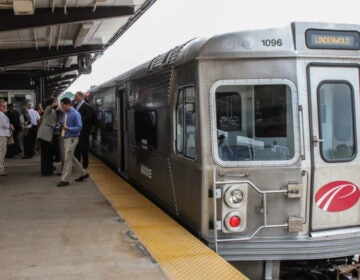Barbara Buono’s running mate – page 2
A Political Force
Silva’s candidacy could establish her — and the SEIU — as a political force in New Jersey if the SEIU jumps into the race and the Buono-Silva ticket does better than expected. Buono will undoubtedly get the blame if Christie’s gigantic lead holds up.
For the SEIU, the Silva race is a rare opportunity. Few labor leaders get to run on a major party ticket for statewide office. Eaton could not think of one in recent years, and the last labor leader to run statewide in New Jersey was state AFL-CIO Secretary-Treasurer Vincent Murphy, the unsuccessful Democratic nominee for governor in 1943. That, of course, was at the height of the labor movement, when more than 40 percent of New Jersey workers and 31.1 percent of all U.S. workers belonged to unions, compared to just 16.1 percent and 11.3 percent last year.
Buono already has been running as an unabashed pro-labor liberal, and Silva’s candidacy will provide an opportunity for her to make a case in two of the nation’s top media markets that labor unions that organize low-wage workers are the solution to what ails New Jersey’s and the nation’s economy, rather than the problem – a message that ties in with the Democratic push for passage of a constitutional amendment on the November ballot raising the minimum wage.
Further, Buono is running against Christie, who first made a national reputation with his YouTube videos bashing public employee labor unions and is one of the front-runners for the Republican presidential nomination if he wins big in November. That possibility might give the SEIU an incentive to spend a few million dollars helping the Buono-Silva ticket reach its matching-fund target and attacking Christie now, rather than having to spend tens of millions later.
The Local Connection
While the SEIU’s national political action fund would be subject to New Jersey campaign contribution limits, the union has 150 locals representing 1.1 million health care workers, 1 million government employees and 225,000 building property services workers throughout the country. Silva is a New Jersey executive vice president of the multi-state Local 1199 Health Care Workers East, reputedly the world’s largest union local with 300,000 members.
The union has a history of spending heavily on state races. Last year, SEIU’s California unions spent more than $4 million on several public questions and Democrat Jerry Brown’s successful gubernatorial candidacy.
Further, the Citizens United case has opened the door for unions, like corporations or wealthy individuals, to make unlimited contributions through independent-expenditure committees.
In addition to providing contributions directly to the Buono-Silva campaign that would be eligible for 2-to-1 state matching dollars, the SEIU could put unlimited amounts of money into an independent-expenditure committee such as the Garden State Forward fund set up by the New Jersey Education Association, which already has raised and spent $584,897 on this year’s election.
The SEIU emerged as a major national political force in the years after SEIU President Andrew Stern, under whose leadership SEIU’s membership had grown to 1.4 million, led seven major unions – SEIU, United Food and Commercial Workers, Teamsters, Carpenters and Laborers, along with UNITE and HERE (the needle trades and hotel workers unions that later merged) — in breaking away from the AFL-CIO to form the Change to Win coalition.
In a speech that echoed John L. Lewis’s 1935 call for the AFL to put its money into organizing the automobile and steel industries, Stern argued that the union movement needed to put its money and effort into organizing low-paid service sector workers because it could not survive representing less than 12 percent of the nation’s workforce.
“SEIU organized 350,000 home-based workers around the country, mostly in home healthcare and some in childcare,” Eaton said. “They certainly invested more money than any other union in organizing, and organized a lot of immigrant groups and low-wage service workers in a very focused and strategic way. The creation of Change to Win probably helped the United Food and Commercial Workers and the Teamsters in their organizing too.”
Backing Obama
On the political front, while the AFL-CIO sat out the 2008 Democratic primary fight between Obama, Hillary Clinton, and John Edwards, SEIU and the Change to Win coalition endorsed Obama early, providing critical organizing in caucus states and door-to-door campaigning in primary states. It is hard to calculate the full campaign expenditures provided by SEIU and its various locals at the federal, state and local levels, but Stern told the Las Vegas Sun in May 2009 that “we spent a fortune to elect Barack Obama — $60.7 million to be exact — and we’re proud of it.” SEIU provided equally critical get-out-the-vote staffing in targeted states in the 2012 presidential campaign, and is estimated to have spent more than $100 million overall on campaigns during the 2008 and 2012 cycles.
The U.S. Supreme Court, ruling in a California case brought against the SEIU, last June barred the union and all other labor organizations from taking automatic deductions for political action, but about 300,000 SEIU members subsequently signed up to donate an extra $7 per paycheck to continue SEIU’s political activities.
The SEIU’s political involvement as a “well-funded” union didn’t escape the notice of the Christie campaign, which lost no time attacking Buono’s selection of Silva.
“In the most important decision a gubernatorial candidate makes, Barbara Buono chose someone who is wholly unqualified to be governor, which is really the only requirement,” Kevin Roberts, Christie’s campaign spokesman said in a statement issued last Thursday. “Instead of picking a qualified Democrat for lieutenant governor, in a blatantly political, Jon Corzine-era move, she has chosen an activist from a well-funded labor union.”
______________________________________________________
NJ Spotlight, an independent online news service on issues critical to New Jersey, makes its in-depth reporting available to NewsWorks.
WHYY is your source for fact-based, in-depth journalism and information. As a nonprofit organization, we rely on financial support from readers like you. Please give today.




